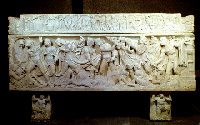Conflict in Orestes
William Lynch's Model based on The Oresteia

Lynch argues that the three plays of the trilogy represent three phases in anyone's shift in worldview:
DRAMA: the undergoing of a tragic action; the situation that creates instability in one's understanding of the world.
- Agamemnon's murder by Clytaemenstra and Aegisthus begins the cycle of tragic revenge.
PATHOS: the unavoidable, pathetic result of the present instability.
- Orestes must kill his mother. If he does not, the Furies will hunt him for denying the law of vengeance. If he does, the Furies will hunt him for matricide. This is a no-win situation.
MATHOS: the new understanding that results from the suffering. A new model and a new stability result.
- Orestes is vindicated as the Athenian judicial system learns to abide by a new understanding of law.
Conflict in Aeschylus’ The Eumenides
There are four basic conflicts in Aeschylus’ play: conflicts between old and new gods, conflicts between models of society, conflicts between genders, and conflicts between views of justice.
Two Rival Families of God
The Furies trace their ancestry back to the ancient god, Chasm:
Chasm – Night – Fate – Furies
Athena and Apollo trace their ancestry back to the ancient gods, Heaven and Earth:
Heaven/Earth – 12 Titans – Zeus – Athena and Apollo
Two Rival Models of Society
Blood-Relations and Family (Oikos) – The Furies base their judgment of Orestes on the ancient claims of family vengeance. The oikos or household is the central, predominant value.
Legal Relations of the City (Polis) – Apollo and Athena base their claims on agreements, contracts, and oaths that can be tested in a court of law. This includes the marriage contract. The polis or city is a higher value that subsumes the oikos.
Two Rival Genders
The Furies, despite their horrific appearance, are recognizably female. They stress the physical ties and claims that Clytamenestra had on Orestes.
Apollo stresses the legal abstractions associated with the masculine claims of Agamemnon. Even Athena is associated with Zeus alone.
Two Rival Views of State
The Furies stress punishment claims associated with personal family obligations and feuds. Its center is Delphi.
Athena stresses a punishment abstracted and carried out by the state. Its center is Athens.
-- adapted from Leithart, Peter J. Heroes of the City of Man: A Christian Guide to Select Ancient Literature. Moscow, Idaho: Canon P, 1999.
